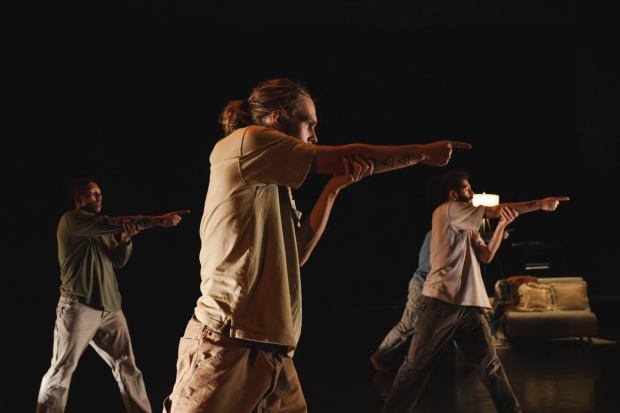“This is awesome,” said KC Bevis at the tail end of her first curtain speech as the new artistic director of Chicago Dance Crash. The theatrical street dance company formed more than 20 years ago by a trio of Illinois State University grads has new leadership, with Bevis and executive director Jessica Leyva picking up where Jessica Deahr and Mark Hackman left off last year.
A trio of new works collectively called “Rubbernecks” runs just two nights at the Ruth Page Center for the Arts. This changing of the guard was designed to usher in a new era of fresh leadership, but Bevis, of course, is a familiar face at Crash, having danced for the company for nearly half of its history.
Thus “Rubbernecks” was pretty much a return to form, stripping back to basics from the flashy, cinematic narrative works they’ve trafficked in lately, and serving up something that looks very much like Crash in its early days. The eight-piece ensemble’s patchwork of training and influences centers street dance with contemporary dance theater as the seasoning — barefoot B-boys and girls, so to speak.
We get to know them better in “On to the Other,” a rangy, introspective gaze at identity by Crash alum Elijah Motley. Near the top of the piece, a group of seven walks to the stage’s edge and stands there for what feels like forever. In fact, it’s one of the most powerful images of the night. They’re looking at, not through us, as some performers do. In the relatively tiny Ruth Page theater, it feels intimate and vulnerable, as if to say, “Look at me. No really — look at me. See me.”
One by one, each dancer removes their shoes and socks and retreats into an orderly scatter plot upstage, methodically joining a muted top rock pattern in unison with one another. For nearly all of its 20-ish minutes, “On the Other” goes like this, oscillating between individuation and conformity. Pairs come and go from an impromptu living room of sorts, launched from a cozy setting in an upstage corner staged with a settee, floor lamp, guitar amp with microphone, and a few other domestic odds and ends. This intriguing house party looks primed for karaoke. Instead, duos take turns speaking memories clearly belonging to their partner — one dancer replacing his or her ruminations with the other. Reclined over Hannah “June” Barrows, Sawyer Newsome talks about being a kid at the Rhode Island beaches. It’s Barrows’ story, about how two girls on a beach together garnered stares. Tina Diaz explains her confusion and concern about being a white male dancer in hip hop culture. She climbs on Logan “L2K” Howell as she says this; it’s his story, not hers.
To what end they engage with this exercise isn’t totally clear. Empathy, probably. Confronting stereotypes? Maybe. But it is honestly beautiful and surrounded by an elegant composition that is approximately three parts James Morrow (another Chicago expat who teaches at Motley’s alma mater, Old Dominion University), and one part Trisha Brown.
The evening’s two other offerings, a semi-structured trio by Bevis and a freestyle from company member Ibrahim Sabbi, are packaged to appear connected to “On the Other,” with that pop-up lounge space a continual touchpoint. But a pervasively monotone mood didn’t sizzle quite often enough. Over-designed lighting piercing through too much thick haze made the dancers almost invisible at points, not helped by a same-same, muted color pallets in pedestrian costumes. Despite different approaches, visions and movement vocabularies, the back half of the evening became almost indistinguishable from the front — particularly after hearing and witnessing the real-life stories of those humans on stage.
“Rubbernecking” is slang for bystanders who can’t look away — drivers craning their necks at an accident causing a gapers’ delay, for example. None of these pieces seems to say anything directly about that, apart from maybe the post-apocalyptic look and feel of Bevis’ piece of the same name. But it is perhaps a reminder of Crash’s origin story, disruptors shaking up standards and norms and subverting expectations of what “concert dance” can and should be. On that point, Chicago Dance Crash has always known who they are, even if the years under Deahr’s consistent leadership were more the exception than the rule. One thing has always been true: The dancers are incredible. When Sabbi’s freestyle finally cracked open, the literal haze lifted and these dancers were left to their own devices, cyphering to an insatiable beat by Ron Trent, DJ-ed live by Bevis on a riser above the “living room.” That’s when we saw a glimmer of what can and should be for Crash’s future under her watch.
Lauren Warnecke is a freelance critic.
Review: “Rubbernecks” (2.5 stars)
When: Through 7 p.m. Saturday
Where: Ruth Page Center for the Arts, 1016 N. Dearborn St.
Running time: 90 minutes with one intermission
Tickets: $25 at chicagodancecrash.com



